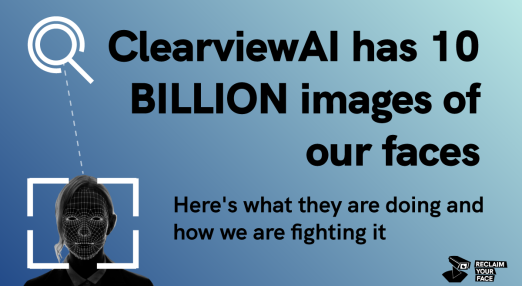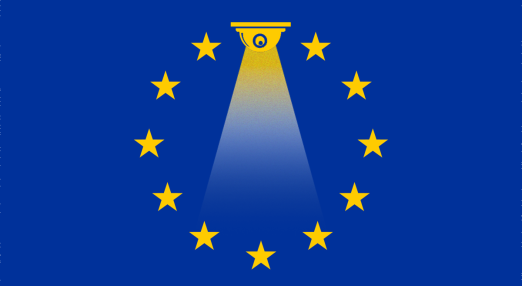How can you influence the AI Act in order to ban biometric mass surveillance across Europe?
The EU is currently negotiating the Artificial Intelligence (AI) Act. This future law offers the chance to effectively ban biometric mass surveillance. This article aims to offer an overview of how the EU negotiates its laws and the key AI Act moments in which people can make their voices heard.
Filter resources
-

How can you influence the AI Act in order to ban biometric mass surveillance across Europe?
The EU is currently negotiating the Artificial Intelligence (AI) Act. This future law offers the chance to effectively ban biometric mass surveillance. This article aims to offer an overview of how the EU negotiates its laws and the key AI Act moments in which people can make their voices heard.
Read more
-

About ClearviewAI’s mockery of human rights, those fighting it, and the need for EU to intervene
Clearview AI describes itself as ‘The World’s Largest Facial Network’. However, a quick search online would reveal that the company has been involved in several scandals, covering the front page of many publications for all the wrong reasons. In fact, since New York Times broke the story about Clearview AI in 2020, the company has been constantly criticised by activists, politicians, and data protection authorities around the world. Read below a summary of the many actions taken against the company that hoarded 10 billion images of our faces.
Read more
-

The Clearview/Ukraine partnership – How surveillance companies exploit war
Clearview announced it will offer its surveillance tech to Ukraine. It seems no human tragedy is off-limits to surveillance companies looking to sanitise their image.
Read more
-

EU AI Act needs clear safeguards for AI systems for military and national security purposes
EDRi affiliate ECNL presents the second set of their proposals on exemptions and exclusions of AI used for military and national security purposes from the AIA, also endorsed by European Digital Rights (EDRi), Access Now, AlgorithmWatch, ARTICLE 19, Electronic Frontier Finland (EFFI), Electronic Privacy Information Center (EPIC) and Panoptykon Foundation.
Read more
-

Italian DPA fines Clearview AI for illegally monitoring and processing biometric data of Italian citizens
On 9 March 2022, the Italian Data Protection Authority fined the US-based facial recognition company Clearview AI EUR 20 million after finding that the company monitored and processed biometric data of individuals on Italian territory without a legal basis. The fine is the highest expected according to the General Data Protection Regulation, and it was motivated by a complaint sent by the Hermes Centre in May 2021 in a joint action with EDRi members Privacy International, noyb, and Homo Digitalis—in addition to complaints sent by some individuals and to a series of investigations launched in the wake of the 2020 revelations of Clearview AI business practices.
Read more
-

The EU AI Act and fundamental rights: Updates on the political process
The negotiations of the EU’s Artificial Intelligence Act (AIA) are finally taking shape. With lead negotiators named, the publication of Council compromises, and the formation of civil society coalitions on the AIA, 2022 will be an important year for the regulation of AI systems.
Read more
-

Building the biometric state: Police powers and discrimination
This report examines the development and deployment of biometric identification technologies by police and border forces in Europe, and warns that the increasing use of the technology is likely to exacerbate existing problems with racist policing and ethnic profiling.
Read more
-

The European Commission does not sufficiently understand the need for better AI law
The Dutch Senate shares the concerns Bits of Freedom has about the Artificial Intelligence Act and wrote a letter to the European Commission about the need to better protect people from harmful uses of AI such as through biometric surveillance. The Commission has given a response to this which is not exactly reassuring.
Read more
-

Civil society calls on the EU to ban predictive AI systems in policing and criminal justice in the AI Act
40+ civil society organisations, led by Fair Trials and European Digital Rights (EDRi) are calling on the EU to ban predictive systems in policing and criminal justice in the Artificial Intelligence Act (AIA).
Read more
-

Technologies for border surveillance and control in Italy
This research points out that identification and categorisation systems for migrants, refugees, and asylum-seekers, rely on vast quantities of biometric data including fingerprints and facial images. It is, however, often difficult to assess how these procedures are managed. Upon identification, the aforementioned groups have limited knowledge and awareness about where and how their personal and biometric data are going to be stored and used, hindering them from countering the pressure that this flow of information puts on their subsequent living conditions in Italy and in the European Union.
Read more
-

Short Film “Reclaim Your Face”: the harms of Biometric Mass Surveillance to society
‘Biometric Mass Surveillance pose a danger to society’ is the main message of Alexander Lehmann's latest short film. And there is no better place to premier this movie than at the last Chaos Computer Club's end of the year event rC3. The film "Reclaim Your Face" highlights the issues surrounding biometric mass surveillance and underlines the harms that its’ systems pose to our society.
Read more
-

2022: Important consultations for your Digital Rights!
Public consultations are an opportunity to influence future legislation at an early stage, in the European Union and beyond. They are your opportunity to help shaping a brighter future for digital rights, such as your right to a private life, data protection, or your freedom of opinion and expression.
Read more
